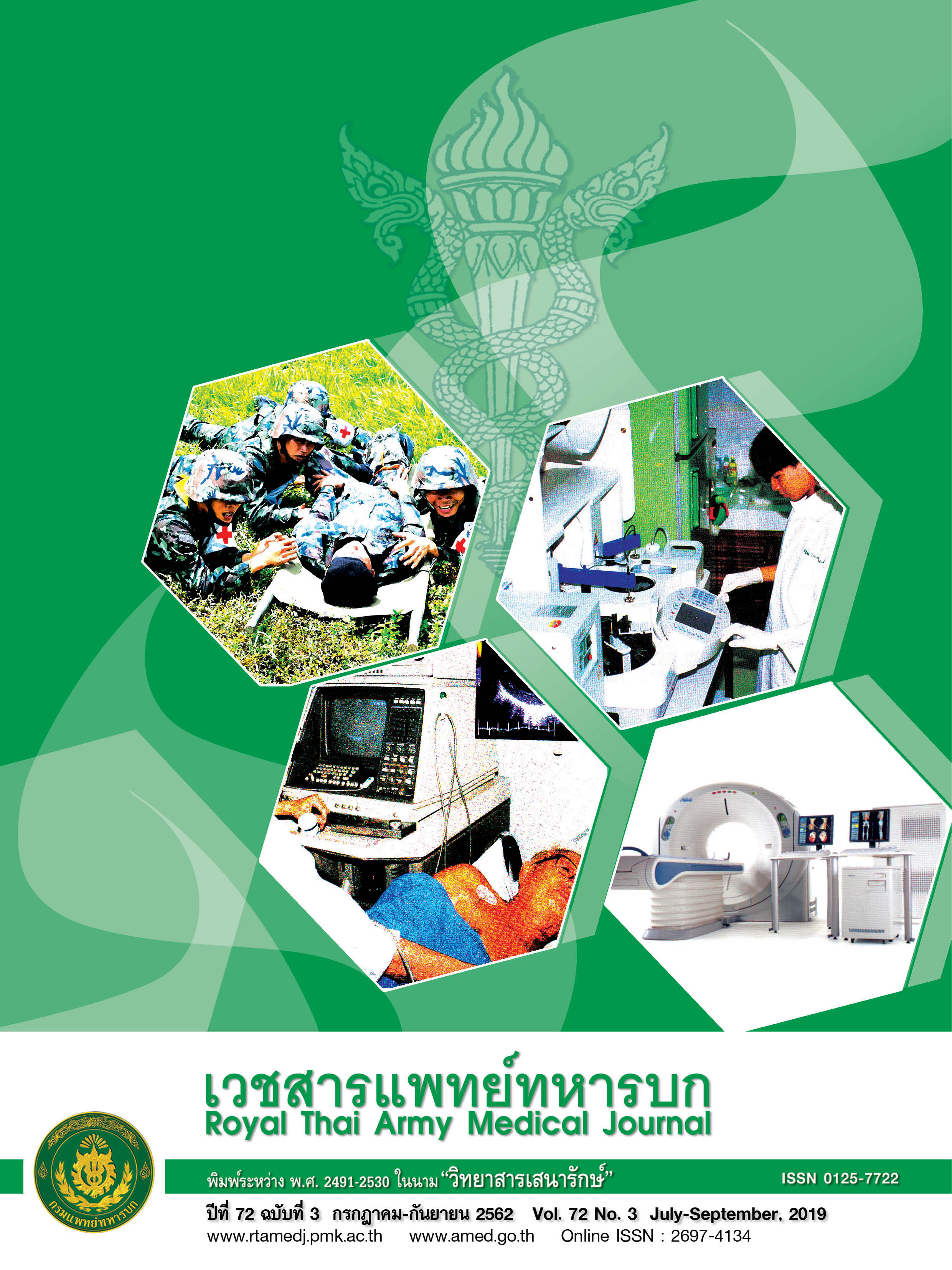การสำรวจสถานะสุขภาพและมุมมองด้านสุขภาพของผู้สูงอายุในชุมชน จังหวัดสระบุรี
Main Article Content
บทคัดย่อ
บทนำ ผู้สูงอายุเป็นวัยที่มีความเสี่ยงต่อโรคทางด้านร่างกายมากกว่าวัยอื่นๆ โดยเฉพาะกลุ่มโรคไม่ติดต่อเรื้อรัง ซึ่งโรคไม่ติดต่อเหล่านี้ สามารถลดปัจจัยเสี่ยงต่อการเป็นโรค หรือลดโอกาสเกิดภาวะแทรกซ้อนต่างๆได้ หากเรามีความรู้ ปรับวิถีชีวิตให้ดี และตรวจติดตามรักษาต่อเนื่อง วัตถุประสงค์ ศึกษาสถานะสุขภาพ ความชุกของอาการทางกาย โรคเรื้อรัง และมุมมองด้านสุขภาพของผู้สูงอายุ ในชุมชนหนึ่ง ณ จังหวัดสระบุรี รวมถึงศึกษาความสัมพันธ์ระหว่างสถานะสุขภาพและมุมมองด้านสุขภาพของผู้สูงอายุในชุมชนดังกล่าว เพื่อให้ทราบถึงปัญหา การแก้ไขและเตรียมการวางแผนดูแลให้เหมาะสมกับบริบทของสังคมต่อไป วัสดุและวิธีการ วิเคราะห์ข้อมูลจากการศึกษาเชิงพรรณาแบบตัดขวางโดยวิธีการสุ่มตัวอย่างอย่างง่าย โดยการสำรวจและสัมภาษณ์ผู้สูงอายุตั้งแต่ 55 ปีขึ้นไป ณ ตำบลหนึ่งในจังหวัดสระบุรี โดยใช้แบบสอบถามเพื่อประเมินสถานะสุขภาพและมุมมองด้านสุขภาพของผู้สูงอายุ วิเคราะห์ข้อมูลโดยใช้สถิติเชิงพรรณา Fisher’s exact test และ Wilcoxon rank sum test ผลการศึกษา จากกลุ่มตัวอย่าง 240 คน พบว่าร้อยละ 39 มีน้ำหนักตัวมากกว่าเกณฑ์ (BMI ≥ 25 kg/m2) การประเมินสถานะสุขภาพ พบว่า ร้อยละ 93 มีอาการทางกายอย่างน้อย 1 อาการ โดยมีความชุกของอาการปวดข้อ ปวดกล้ามเนื้อมากที่สุดคิดเป็นร้อยละ 83 และร้อยละ 85 มีโรคเรื้อรังอย่างน้อย 1 โรค โรคที่มีความชุกเป็น 3 อันดับแรก ได้แก่ โรคความดันโลหิตสูง โรคข้อเข่าเสื่อม และโรคเบาหวาน โดยคิดเป็นร้อยละ 63.8, 38.3 และร้อยละ 23.3 ตามลำดับ การประเมินมุมมองด้านสุขภาพ พบว่าร้อยละ 42 คิดว่าสุขภาพโดยทั่วไปของตนเองอยู่ในระดับปานกลาง นอกจากนี้พบว่ามุมมองด้านสุขภาพมีความสัมพันธ์กับความชุกของอาการทางกาย และความชุกของโรคเรื้อรัง สรุป ยังพบว่ามีผู้สูงอายุจำนวนมากที่มีภาวะสุขภาพทั่วไปไม่ดีเท่าที่ควร น้ำหนักตัวเกินเกณฑ์ มีอาการทางกายที่ยังไม่ได้รับการรักษา และมีโรคเรื้อรัง ซึ่งการรักษาอาการทางกายและควบคุมภาวะโรคเรื้อรังต่างๆให้ดี ก็จะทำให้ผู้สูงอายุมีมุมมองด้านสุขภาพตนเองดีขึ้น ช่วยให้สุขภาพจิตและคุณภาพชีวิตดีขึ้นได้
Downloads
Article Details
บทความในวารสารนี้อยู่ภายใต้ลิขสิทธิ์ของ กรมแพทย์ทหารบก และเผยแพร่ภายใต้สัญญาอนุญาต Creative Commons Attribution-NonCommercial-NoDerivatives 4.0 International (CC BY-NC-ND 4.0)
ท่านสามารถอ่านและใช้งานเพื่อวัตถุประสงค์ทางการศึกษา และทางวิชาการ เช่น การสอน การวิจัย หรือการอ้างอิง โดยต้องให้เครดิตอย่างเหมาะสมแก่ผู้เขียนและวารสาร
ห้ามใช้หรือแก้ไขบทความโดยไม่ได้รับอนุญาต
ข้อความที่ปรากฏในบทความเป็นความคิดเห็นของผู้เขียนเท่านั้น
ผู้เขียนเป็นผู้รับผิดชอบต่อเนื้อหาและความถูกต้องของบทความของตนอย่างเต็มที่
การนำบทความไปเผยแพร่ซ้ำในรูปแบบสาธารณะอื่นใด ต้องได้รับอนุญาตจากวารสาร


